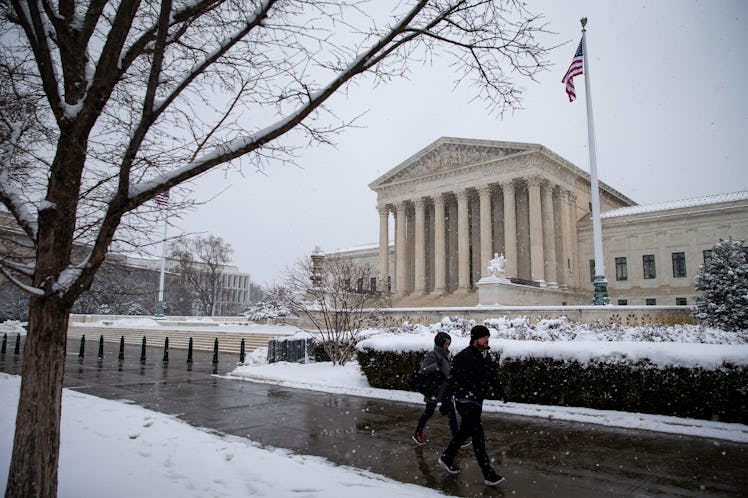
The Latest Supreme Court Action On Abortion Is A Win For Pro-Choice Advocates — For Now
Another day, another action out of the Supreme Court. On Thursday, Feb. 7, the Supreme Court blocked an abortion law that would've enforced new regulations on abortion clinics from going into effect — at least for now. If you listen closely, you can hear the applause from pro-choice advocates all over.
Louisiana's Unsafe Abortion Protection Act would require a doctor to have admitting privileges at a hospital within 30 miles of the facility where the abortion is performed, per CNN, but the nation's highest court isn't going for it. On Thursday, the Supreme Court justices said in a 5-4 vote that they will not allow the state to put the law into effect, with Chief Justice John Roberts joining the court's four liberals in putting a hold on the act. The other more conservative justices, including Clarence Thomas and Neil Gorsuch, would have allowed the law to go into effect, per The Washington Post. Newly placed justice Brett Kavanaugh, who joined the court in the fall of 2018 after a rocky confirmation battle plagued by sexual misconduct allegations (which he strongly denied), wrote a dissent.
As CNN notes, the law has been blocked since its enactment in 2014, with many saying it is medically unnecessary and is simply an effort to restrict abortion. However, the state has argued that such a law would help provide a higher level of physician competence. Significantly, the Louisiana law is notably similar to another abortion restriction law which was previously struck down by the Supreme Court, calling into questions issues of precedent. In 2016, the Supreme Court ruled in favor of abortion clinics in Whole Woman's Health v. Hellerstedt, judging that clinic closures that came as a result of admitting privilege laws and other stringent regulations placed an unconstitutional "undue burden" on those seeking abortions.
The Louisiana law has already reportedly caused several abortion clinics to shut down, given that it can be difficult to for them to get hospital admitting privileges, reported Vox. Hospitals may be unwilling to give admitting privileges to abortion providers for religious or political reasons, or logistical reasons may prevent doctors from qualifying.
In a statement shared with Elite Daily, NARAL Pro-Choice America President Ilyse Hogue praised the decision. "The Supreme Court rightfully refused to uphold a brazen and unconstitutional attempt to ignore identical cases that are intended to shutter abortion clinics in the state, making Roe v. Wade obsolete," she said. But she added a reminder: "While this particular ruling thankfully falls on the right side of history, it illustrates a sobering reminder: the thread that women’s rights hang by is dangerously thin in so many places across the country."
The Supreme Court's action doesn't mean that this issue is over, though — it could still take up the case and uphold the law in the future.
If the court does decide to hear the case, as Vox points out, it could open the door for justices to revisit and possibly overturn Roe v. Wade, the 1973 landmark decision that recognized and protected women's rights to abortion. The possibly of rolling back Roe v. Wade has become heavily discussed as of late, particularly after the appointment of the conservative Kavanaugh, given that President Trump had previously vowed to nominate judges to the court who would "automatically" overturn the decision. Additionally, Kavanaugh wrote in a 2003 email that surfaced during his confirmation hearings that the ruling may not be "settled law of the land," which only fueled more concerns. Elite Daily reached out to representatives for Kavanaugh for further comment on the email, but did not hear back by the time of publication. However, Kavanaugh has tried to quell fears that he would vote to overturn Roe, saying it is "an important precedent of the Supreme Court that has been reaffirmed many times," per CNBC.
And if the court decides not to hear the case, the stay would end and the law would go into effect, per Vox.
As they say, you never know what can happen. So you'll just have to wait and see what happens from here.